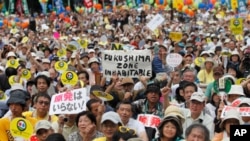Anti-nuclear activists marched in Japan Monday to build momentum for their movement.
An anti-nuclear coalition in Japan says it is trying to gather ten million signatures on a petition to submit to the government by the one-year anniversary of the accident at the Fukushima-1 nuclear power plant.
Organizers predicted 50,000 people would attend Monday's event and say 60,000 actually participated. The police, however, estimate the crowd -- at a rally in a park and a subsequent peaceful march through nearby streets -- totaled only about 20,000 people.
Speaking at the rally, Nobel laureate Kenzaburo Oe called for Japan to follow an example set by Italy. In a referendum three months ago, 94 percent of Italian voters rejected a proposal to return to nuclear power generation.
Oe says Japanese need to fear the harmful physical effects of radiation caused by nuclear accidents as they did after the U.S. atomic bombings of Hiroshima and Nagasaki that ended the Second World War. He says rallies such as this one need to send a strong message to the government and business leaders of Japan.
Oe then helped lead part of the march, which organizers billed as a "parade" rather than a demonstration.
Keiko Ochiai, a well-known feminist essayist, joined the Nobel laureate at the head of the march. She spoke with VOA news about her views on nuclear energy. "We believe that nuke is the reason for the unhappiness of the human beings. So I can't agree with nuclear or nuclear plants itself," she said.
That sentiment has been growing since the March 11th earthquake and tsunami that triggered the meltdown of several reactors at Tokyo Electric's Fukushima-1 nuclear power plant.
Recent polls indicate three-quarters of the public favor a gradual phase-out of nuclear power facilities in Japan, but only one in 10 Japanese want an immediate shutdown of all the plants in the country.
The March nuclear accident was the world's worst since the 1986 Chernobyl disaster in the former Soviet Union. The Fukushima radiation leaks forced thousands of residents to abandon their homes and contaminated crops and meat.
Japan has scant natural resources. That was the primary reason behind the push, over decades, to build nuclear plants and lessen the nation's reliance on imported fuel to generate electricity.
Japan's new prime minister, Yoshihiko Noda, appears to be moderating the stance of his predecessor, Naoto Kan, who was the country's leader at the start of the Fukushima crisis. According to the Kyodo news service, Noda is expected to tell a United Nations conference Thursday that Japan will continue to rely on nuclear plants while making safety at the facilities the top priority.
More than half of Japan's 52 nuclear reactors were offline, in recent months, leading to shortages of electricity. But conservation measures appear to have have helped avoid feared blackouts.
Photos by S. Herman




